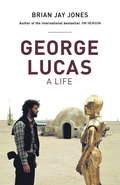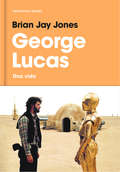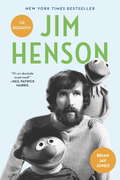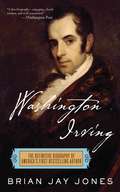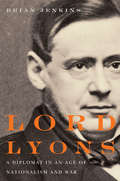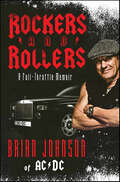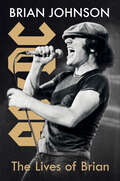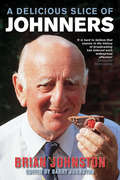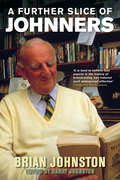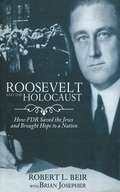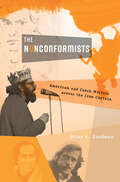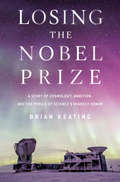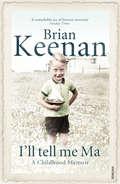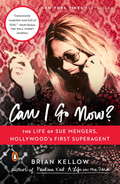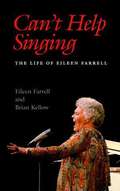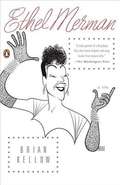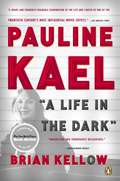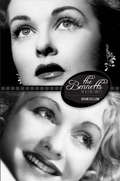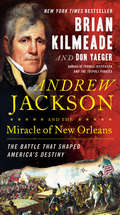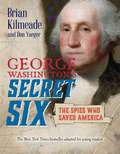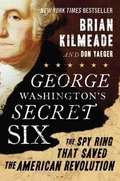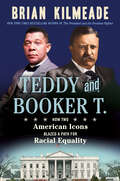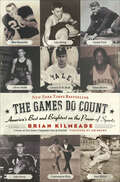- Table View
- List View
George Lucas: A Life
by Brian Jay JonesGeorge Lucas by Brian Jay Jones is the first comprehensive telling of the story of the iconic filmmaker and the building of his film empire, as well as of his enormous impact on cinema. At once a biography, a business manual, and a film history, George Lucas will, for the first time explore the life and work of a fiercely independent writer/director/producer who became one of the most influential filmmakers and cultural icons - a true game changer.On May 25, 1977, a problem-plagued, budget-straining, independent science fiction film opened in a mere thirty-two American movie theatres. Its distributor - 20th Century Fox - were baffled by the film. The film's production had been a disaster from nearly day one, hampered by bad weather, malfunctioning props and ill-fitting costumes. But its release on a quiet Wednesday in May of 1977, changed cinema forever. The film was Star Wars.The fiercely independent thirty-three year-old George Lucas was just getting going. Determined to control every element of the film-making process he had founded Lucasfilm ltd., in 1971. Among his hits, Lucas gave us six Star Wars films and four featuring the globetrotting archaeologist Indiana Jones. Together these ten films have earned more than $6 billion worldwide and won some of the largest and most devoted fan bases ever seen. In 2013 he sold Lucasfilm to Disney for $4.05 billion. Along the way the man who invented the Blockbuster also gave us computer generated imagery (CGI), created a small animation company called Pixar and reinvented the way movies were made, marketed and merchandised.
George Lucas: Una vida
by Brian Jay JonesLa biografía más completa jamás escrita sobre uno de los cineastas más admirados e influyentes de los últimos cincuenta años: Georges Lucas. El 25 de mayo de 1977 se estrenó en apenas cuarenta salas estadounidenses un film con todos los números para fracasar. Sin embargo, pronto mereció grandiosos titulares hasta convertirse en un fenómeno de taquilla que cambió de un plumazo la manera de producir, anunciar y rentabilizar películas. La cinta se titulaba Star Wars y su creador era un tal George Lucas. El cineasta aún volvería a dar el golpe con la saga de Indiana Jones y, no contento con ello, llegó a forjar pequeños imperios: Lucasfilm, THX, Industrial Light & Magic, Pixar. En esta biografía, tanto colegas como competidores de Lucas ofrecen una mirada exhaustiva sobre la vida y los métodos de trabajo de un hombre que transformó la manera de hacer cine y de verlo. Reseñas:«Todo en la trayectoria de Lucas en el cine, desde sus inicios hasta su actual estatus de leyenda, todo está aquí. Los retratos que ofrecen colegas, rivales, mentores y amigos son brutalmente honestos. Una biografía indispensable.»Rolling Stone «Un libro adictivo. Jones retrata a la perfección la presión asfixiante del creador, los encontronazos con los estudios y el baile constante con el fracaso que precedieron a obras maestras como American Graffiti o Star Wars.»BBC «Una biografía clara y veraz, donde hasta el más mínimo detalle sorprende.»The New York Times «Como si de un aguerrido arqueólogo se tratara, Jones sale victorioso del reto, llevando bajo el brazo un relato formidablemente completo de la vida y obra de George Lucas.»Washington Post «Con su prosa hipnótica y sus investigaciones en profundidad, este libro gustará hasta a los seguidores más exigentes de Lucas.»Boston Globe «Incluso los años de formación del director están retratados con maestría. También las reflexiones e interioridades de cómo funciona la industria del cine (y cómo la cambió Lucas) se nos aparecen como una aventura trepidante.»Chicago Tribune
Jim Henson: The Biography
by Brian Jay JonesFor the first time ever--a comprehensive biography of one of the twentieth century's most innovative creative artists: the incomparable, irreplaceable Jim Henson He was a gentle dreamer whose genial bearded visage was recognized around the world, but most people got to know him only through the iconic characters born of his fertile imagination: Kermit the Frog, Bert and Ernie, Miss Piggy, Big Bird. The Muppets made Jim Henson a household name, but they were just part of his remarkable story. This extraordinary biography--written with the generous cooperation of the Henson family--covers the full arc of Henson's all-too-brief life: from his childhood in Leland, Mississippi, through the years of burgeoning fame in America, to the decade of international celebrity that preceded his untimely death at age fifty-three. Drawing on hundreds of hours of new interviews with Henson's family, friends, and closest collaborators, as well as unprecedented access to private family and company archives, Brian Jay Jones explores the creation of the Muppets, Henson's contributions to Sesame Street and Saturday Night Live, and his nearly ten-year campaign to bring The Muppet Show to television. Jones provides the imaginative context for Henson's non-Muppet projects, including the richly imagined worlds of The Dark Crystal and Labyrinth--as well as fascinating misfires like Henson's dream of opening an inflatable psychedelic nightclub. An uncommonly intimate portrait, Jim Henson captures all the facets of this American original: the master craftsman who revolutionized the presentation of puppets on television, the savvy businessman whose dealmaking prowess won him a reputation as "the new Walt Disney," and the creative team leader whose collaborative ethos earned him the undying loyalty of everyone who worked for him. Here also is insight into Henson's intensely private personal life: his Christian Science upbringing, his love of fast cars and expensive art, and his weakness for women. Though an optimist by nature, Henson was haunted by the notion that he would not have time to do all the things he wanted to do in life--a fear that his heartbreaking final hours would prove all too well founded. An up-close look at the charmed life of a legend, Jim Henson gives the full measure to a man whose joyful genius transcended age, language, geography, and culture--and continues to beguile audiences worldwide. Advance praise for Jim Henson "I'm a rabid Jim Henson fan--his brilliant ideas spawned shows that entertained and educated millions, myself included. Jim Henson vibrantly delves into the magnificent man and his Muppet methods. It's an absolute must read!"--Neil Patrick Harris "[Brian Jay Jones's] lucid style, wide-angle perspective, and deep immersion in Henson's exuberantly innovative approach to puppets, television, and film make for a thoroughly compelling read. . . . With verve and insight, Jones illuminates the full scope of Henson's genius, phenomenal productivity, complex private life, zeal to do good, and astronomical influence."--Booklist (starred review) "I worked with Jim for more than thirty years. He was one of my closest friends. And yet I found out things about him in Jim Henson that were new to me. Brian Jay Jones has captured the layers of Jim's genius and humanity, as well as the flaws that made Jim, like all of us, so delightfully imperfect. Jim needed this book to be written. I thank Brian for giving Jim life again. This book has captured the spirit of Jim Henson."--Frank Oz
Washington Irving: The Definitive Biography of America's First Bestselling Author
by Brian Jay JonesBrian Jay Jones crafts a deft biography of the author of "The Legend of Sleepy Hollow" and "Rip van Winkle": quintessential New Yorker, presidential confidant, diplomat, lawyer, and fascinating charmer. The first American writer to make his pen his primary means of support, Washington Irving rocketed to fame at the age of twenty-six. In 1809 he published A History of New York under the pseudonym Diedrich Knickerbocker, to great acclaim. The public's appetite for all things Irving was insatiable; his name alone guaranteed sales.At the time, he was one of the most famous men in the world, a friend of Dickens, Hawthorne, and Longfellow, as well as Astor, van Buren, and Madison. But his sparkling public persona was only one side of this gentleman author. In brilliant, meticulous strokes, Brian Jay Jones renders Washington Irving in all his flawed splendor-someone who fretted about money and employment, suffered from writer's block, and doggedly cultivated his reputation. Jones offers a very human portrait of the often contrasting public and private lives of this true American original.
Lord Lyons
by Brian JenkinsThe British ambassador in Washington during the US Civil War and ambassador in Paris before and after the Franco-Prussian war, Lord Lyons (1817-1887) was one of the most important diplomats of the Victorian period. Although frequently featured in histories of the United States and Europe in the second half of the nineteenth century, and in discussions and analyses of British foreign policy, he has remained an ill-defined figure. In Lord Lyons: A Diplomat in an Age of Nationalism and War, Brian Jenkins explains the man and examines his career. Based on a staggering study of primary sources, he presents a convincing portrait of a subject who rarely revealed himself personally. Though he avoided publicity, Lyons came to be regarded as his nation's premier diplomat as his career took him to the heart of the great international issues and crises of his generation. As minister to the United States he played a vital role in preserving Anglo-American peace and was a powerful voice opposing Anglo-French intervention in the Civil War. While ambassador to the Ottoman Empire, he helped to prevent French control of the Suez Canal then under construction. In France, he maintained an amiable and constructive relationship with a bitter nation struggling to reorganize itself and its constitution after the Franco-Prussian War. For many historians Lord Lyons has been difficult to ignore but hard to admire. In rescuing him as a truly important historical figure, Jenkins details for the first time the personal and public strategies Lyons employed through decades of exemplary diplomatic service on both sides of the Atlantic.
Lord Lyons: A Diplomat in an Age of Nationalism and War
by Brian JenkinsThe British ambassador in Washington during the US Civil War and ambassador in Paris before and after the Franco-Prussian war, Lord Lyons (1817-1887) was one of the most important diplomats of the Victorian period. Although frequently featured in histories of the United States and Europe in the second half of the nineteenth century, and in discussions and analyses of British foreign policy, he has remained an ill-defined figure. In Lord Lyons: A Diplomat in an Age of Nationalism and War, Brian Jenkins explains the man and examines his career. Based on a staggering study of primary sources, he presents a convincing portrait of a subject who rarely revealed himself personally. Though he avoided publicity, Lyons came to be regarded as his nation's premier diplomat as his career took him to the heart of the great international issues and crises of his generation. As minister to the United States he played a vital role in preserving Anglo-American peace and was a powerful voice opposing Anglo-French intervention in the Civil War. While ambassador to the Ottoman Empire, he helped to prevent French control of the Suez Canal then under construction. In France, he maintained an amiable and constructive relationship with a bitter nation struggling to reorganize itself and its constitution after the Franco-Prussian War. For many historians Lord Lyons has been difficult to ignore but hard to admire. In rescuing him as a truly important historical figure, Jenkins details for the first time the personal and public strategies Lyons employed through decades of exemplary diplomatic service on both sides of the Atlantic.
Rockers and Rollers: A Full-Throttle Memoir
by Brian Johnson“Surprisingly refreshing . . . You don’t need to know anything about AC/DC to appreciate his funny and highly descriptive writing about [cars].” —Publishers WeeklyFrom “Pink Cadillac” to “Low Rider” to “Little Red Corvette,” rock music has always had a racy love affair with cars. And AC/DC lead singer Brian Johnson is not only a rock legend, second-to-none at infusing razor-sharp lyrics with the screaming metal energy of a true rock and roller, but also a dyed-in-the-wool car fanatic. Books like AC/DC: Maximum Rock and Roll and Why AC/DC Matters revealed the secrets of the world’s greatest rock band—now, in Rockers and Rollers, fans will get a rare, riveting window into Brian Johnson’s other driving passion, his love for automobiles. From teenage memories in the backs of beat-up coups to a side career as a racecar driver, Johnson shares his tantalizing life story—a memoir told through his lifelong love affair with cars.“A fast, fun read . . . Johnson’s gifts for storytelling and humor shine.” —The New York Times
The Lives of Brian: A Memoir
by Brian JohnsonBrian Johnson’s memoir from growing up in a small town to starting his own band to ultimately replacing Bon Scott, the lead singer of one of the world biggest rock acts, AC/DC. They would record their first album together, the iconic Back in Black, which would become the biggest selling rock album of all time.Brian Johnson was born to a steelworker and WWII veteran father and an Italian mother, growing up in New Castle Upon Tyne, England, a working-class town. He was musically inclined and sang with the church choir. By the early ’70s he performed with the glam rock band Geordie, and they had a couple hits, but it was tough going. So tough that by 1976, they disbanded and Brian turned to a blue-collar life.Then 1980 changed everything. Bon Scott, the lead singer and lyricist of the Australian rock band AC/DC died at 33. The band auditioned singers, among them Johnson, whom Scott himself had seen perform and raved about. Within days, Johnson was in a studio with the band, working with founding members Angus and Malcolm Young, Cliff Williams, and Phil Rudd, along with producer Mutt Lange.When the album, Back in Black, was released in July—a mere three months after Johnson had joined the band—it exploded, going on to sell 50 million copies worldwide, and triggering a years-long worldwide tour. It has been declared “the biggest selling hard rock album ever made” and “the best-selling heavy-metal album in history.” The band toured the world for a full year to support the album, changing the face of rock music—and Brian Johnson’s life—forever.
A Delicious Slice Of Johnners
by Brian JohnstonFollowing Brian Johnston's death in 1994, Prime Minister John Major appeared to speak for the nation when he remarked that 'Summers will never be the same.' To an Englishman's ears, the sound of leather against willow will always be closely associated with the cheerful tones of Johnners.Brian Johnston was a man who admitted: 'I have this absurd hankering to make people laugh.' He also summed up his books as 'the meanderings of a remarkably happy and lucky person, to whom life, like cricket, is a funny game and still a lot of fun.' Lovingly edited by his eldest son, Barry, A Delicious Slice of Johnners is a wonderfully enjoyable compendium of three of Johnners' best loved books, the autobiographies It's Been a Lot of Fun and It's a Funny Game, and Rain Stops Play
A Further Slice Of Johnners
by Brian JohnstonWhen Brian Johnston was a schoolboy, his reports were full of phrases such as 'talks too much in school' and 'apt to be a buffoon'. Later millions of radio listeners would be delighted to discover that some things never changed! Johnners brought his unique wit and personal charm to an enormous range of BBC radio and television programmes for nearly 50 years, from In Town Tonight and Down Your Way to Test Match Special. After Brian died in 1994, Christopher Martin-Jenkins wrote: 'It is hard to believe that anyone in the history of broadcasting has induced such widespread affection'. A Further Slice of Johnners covers Brian's early days, from his childhood in Hertfordshire and his schooldays at Eton and Oxford to his job in the family coffee business in the City and his service with the Grenadier Guards during the Second World War. There is also a selection of the most memorable characters and locations from his fifteen years on the Radio Four programme Down Your Way. Finally there is a collection of Brian's popular 'View From the Boundary' interviews on Test Match Special, including fascinating conversations with Eric Idle, John Major and Peter O'Toole.
Roosevelt and the Holocaust: How FDR Saved the Jews and Brought Hope to a Nation
by Robert L. Beir Brian JosepherThe year was 1932. At age fourteen Robert Beir’s journey through life changed irrevocably when a classmate called him a “dirty Jew.” Suddenly Beir encountered the belligerent poison of anti-Semitism. The safe confines of his upbringing had been violated. The pain that he felt at that moment was far more hurtful than any blow. Its memory would last a lifetime.Beir’s experiences with anti-Semitism served as a microcosm for the anti-Semitism among the majority of Americans. That year, a politician named Franklin Delano Roosevelt ascended to the presidency. Over the next twelve years, he became a scion of optimism and carried a refreshing, unbridled confidence in a nation previously mired in fear and deeply depressed. His policies and ethics saved the capitalist system. His strong leadership and unwavering faith helped to defeat Hitler.The Jews of America revered President Roosevelt. To a young Robert Beir, Roosevelt was an American hero. In mid-life, however, Beir experienced a conflict. New research was questioning Roosevelt’s record regarding the Holocaust. He felt compelled to embark on a historian’s quest, asking only the toughest questions of his childhood hero, including: How much did President Roosevelt know about the Holocaust? What could Roosevelt have done? Why wasn’t there an urgent rescue effort?In answering these questions and others, Robert Beir has done a masterful job. This book is graphically written, well-researched, and provocative. The portrait depicted of a man he once thought to be morally incorruptible amidst a circumstance of moral bankruptcy is truly unforgettable.
The Nonconformists: American and Czech Writers across the Iron Curtain
by Brian K. GoodmanHow risky encounters between American and Czech writers behind the Iron Curtain shaped the art and politics of the Cold War and helped define an era of dissent.“In some indescribable way, we are each other’s continuation,” Arthur Miller wrote of the imprisoned Czech playwright Václav Havel. After a Soviet-led invasion ended the Prague Spring, many US-based writers experienced a similar shock of solidarity. Brian Goodman examines the surprising and consequential connections between American and Czech literary cultures during the Cold War—connections that influenced art and politics on both sides of the Iron Curtain.American writers had long been attracted to Prague, a city they associated with the spectral figure of Franz Kafka. Goodman reconstructs the Czech journeys of Allen Ginsberg, Philip Roth, and John Updike, as well as their friendships with nonconformists like Havel, Josef Škvorecký, Ivan Klíma, and Milan Kundera. Czechoslovakia, meanwhile, was home to a literary counterculture shaped by years of engagement with American sources, from Moby-Dick and the Beats to Dixieland jazz and rock ’n’ roll. Czechs eagerly followed cultural trends in the United States, creatively appropriating works by authors like Langston Hughes and Ernest Hemingway, sometimes at considerable risk to themselves.The Nonconformists tells the story of a group of writers who crossed boundaries of language and politics, rearranging them in the process. The transnational circulation of literature played an important role in the formation of new subcultures and reading publics, reshaping political imaginations and transforming the city of Kafka into a global capital of dissent. From the postwar dream of a “Czechoslovak road to socialism” to the neoconservative embrace of Eastern bloc dissidence on the eve of the Velvet Revolution, history was changed by a collision of literary cultures.
Losing the Nobel Prize: A Story Of Cosmology, Ambition, And The Perils Of Science's Highest Honor
by Brian KeatingThe inside story of a quest to unlock one of cosmology’s biggest mysteries, derailed by the lure of the Nobel Prize. What would it have been like to be an eyewitness to the Big Bang? In 2014, astronomers wielding BICEP2, the most powerful cosmology telescope ever made, revealed that they’d glimpsed the spark that ignited the Big Bang. Millions around the world tuned in to the announcement broadcast live from Harvard University, immediately igniting rumors of an imminent Nobel Prize. But had these cosmologists truly read the cosmic prologue or, swept up in Nobel dreams, had they been deceived by a galactic mirage? In Losing the Nobel Prize, cosmologist and inventor of the BICEP (Background Imaging of Cosmic Extragalactic Polarization) experiment Brian Keating tells the inside story of BICEP2’s mesmerizing discovery and the scientific drama that ensued. In an adventure story that spans the globe from Rhode Island to the South Pole, from California to Chile, Keating takes us on a personal journey of revelation and discovery, bringing to vivid life the highly competitive, take-no-prisoners, publish-or-perish world of modern science. Along the way, he provocatively argues that the Nobel Prize, instead of advancing scientific progress, may actually hamper it, encouraging speed and greed while punishing collaboration and bold innovation. In a thoughtful reappraisal of the wishes of Alfred Nobel, Keating offers practical solutions for reforming the prize, providing a vision of a scientific future in which cosmologists may, finally, be able to see all the way back to the very beginning.
I'll Tell Me Ma: A Childhood Memoir
by Brian KeenanLocal rather than international, the dramas and privations described in this memoir are not the stuff of headlines. This is the story of an ordinary boy growing up in Belfast after the war; an ordinary boy who would go on to become world-famous as a hostage in Beirut and author of the extraordinary testimony of imprisonment and survival that was An Evil Cradling. Brian Keenan has captured the vanished world of 1950s Belfast in all its vivid vernacular and grey, post-war austerity. I'll Tell Me Ma is an affectionate story of a disaffected childhood. At the centre is a shy, self-conscious boy of unusual moral integrity; a boy puzzled by religion and sectarianism, in love with books and music and full of curiosity about the world outside. It is also a book about coming-to-terms with the past: a resounding, thrilling record of redemption.
Can I Go Now?
by Brian KellowA lively and colorful biography of Hollywood's first superagent--one of the most outrageous showbiz characters of the 1960s and 1970s whose clients included Barbra Streisand, Ryan O'Neal, Faye Dunaway, Michael Caine, and Candice BergenBefore Sue Mengers hit the scene in the mid-1960s, talent agents remained quietly in the background. But staying in the background was not possible for Mengers. Irrepressible and loaded with chutzpah, she became a driving force of Creative Management Associates (which later became ICM) handling the era's preeminent stars.A true original with a gift for making the biggest stars in Hollywood listen to hard truths about their careers and personal lives, Mengers became a force to be reckoned with. Her salesmanship never stopped. In 1979, she was on a plane that was commandeered by a hijacker, who wanted Charlton Heston to deliver a message on television. Mengers was incensed, wondering why the hijacker wanted Heston, when she could get him Barbra Streisand.Acclaimed biographer Brian Kellow spins an irresistible tale, exhaustively researched and filled with anecdotes about and interviews more than two hundred show-business luminaries. A riveting biography of a powerful woman that charts show business as it evolved from New York City in the 1950s through Hollywood in the early 1980s, Can I Go Now? will mesmerize anyone who loves cinema's most fruitful period.
Can I Go Now?: The Life of Sue Mengers, Hollywood's First Superagent
by Brian Kellow"To call Sue Mengers a 'character' is an understatement, unless the word is written in all-caps, followed by an exclamation point and modified by an expletive. And based on Brian Kellow's assessment in his thoroughly researched Can I Go Now? even that description may be playing down her personality a bit." --Jen Chaney, The Washington Post* A NY Times Culture Bestseller * An Entertainment Weekly Best Pop Culture Book of 2015 * A Booklist Top Ten Arts Book of 2015 *A lively and colorful biography of Hollywood's first superagent--one of the most outrageous showbiz characters of the 1960s and 1970s whose clients included Barbra Streisand, Ryan O'Neal, Faye Dunaway, Michael Caine, and Candice BergenBefore Sue Mengers hit the scene in the mid-1960s, talent agents remained quietly in the background. But staying in the background was not possible for Mengers. Irrepressible and loaded with chutzpah, she became a driving force of Creative Management Associates (which later became ICM) handling the era's preeminent stars.A true original with a gift for making the biggest stars in Hollywood listen to hard truths about their careers and personal lives, Mengers became a force to be reckoned with. Her salesmanship never stopped. In 1979, she was on a plane that was commandeered by a hijacker, who wanted Charlton Heston to deliver a message on television. Mengers was incensed, wondering why the hijacker wanted Heston, when she could get him Barbra Streisand.Acclaimed biographer Brian Kellow spins an irresistible tale, exhaustively researched and filled with anecdotes about and interviews more than two hundred show-business luminaries. A riveting biography of a powerful woman that charts show business as it evolved from New York City in the 1950s through Hollywood in the early 1980s, Can I Go Now? will mesmerize anyone who loves cinema's most fruitful period.From the Hardcover edition.
Can't Help Singing: The Life of Eileen Farrell
by Eileen Farrell Brian KellowEileen Farrell is blessed with two voices. A classically-trained dramatic soprano who also loves to belt pop songs and torch the blues, she successfully conquered the worlds of opera and popular music over the course of her whirlwind career. Now, Farrell shares reminiscences about her remarkable professional and personal life. With candor, humor, and affection, she recalls her New England childhood, her overnight success at age twenty as star of her own CBS radio show, her big break dubbing vocals for Eleanor Parker in the MGM movie Interrupted Melody, and her many guest appearances on television shows. Farrell discusses her rise to fame as an opera star, from her highly acclaimed performance in Medea in 1955, to her historic debut at the Metropolitan Opera in Alceste in 1960. She also fondly recollects her marriage of forty years to New York police officer Robert Reagan and her life outside the limelight, including her frustrating tenure as a faculty member at Indiana University. Farrell speaks frankly about her tumultuous years at the Met, where her head-to-head confrontations with Sir Rudolph Bing brought her promising operatic career to an abrupt close after five seasons. While she loved singing the music of Verdi, Mascagni, and Giordano, Farrell reveals that she never reconciled herself to the life of a diva, preferring the friendliness of show business to the aloofness of the opera world. Populated with such figures as Leonard Bernstein, Arturo Toscanini, Maria Callas, Ethel Merman, Mabel Mercer, and Carol Burnett, this engaging memoir takes the reader from backstage at the Met to behind-the-scenes of the Ed Sullivan Show, providing a fascinating view of opera and the entertainment industry. Eileen Farrell's legion of fans will delight in her inviting story of a career that was like no other singer's.
Ethel Merman
by Brian KellowMore than twenty years after her death, Ethel Merman continues to set the standard for American musical theater. The stories about the supremely talented, famously strong-willed, fearsomely blunt, and terrifyingly exacting woman are stuff of legend. But who was Ethel Agnes Zimmermann, really? Brian Kellow's definitive biography of the great Merman is superb, and the first account to examine both the artist and the woman with as much critical rigor as empathy. Through dozens of interviews with her colleagues, friends, and family members, Kellow traces the arc of her life and her thirty-year singing career to reveal many surprising facts about Broadway's biggest star.
Pauline Kael
by Brian KellowSelected by The New York Times Book Review as a Notable Book of the Year The first biography of The New Yorker's influential, powerful, and controversial film critic. A decade after her death, Pauline Kael remains the most important figure in film criticism today, in part due to her own inimitable style and power within the film community and in part due to the enormous influence she has exerted over an entire subsequent generation of film critics. During her tenure at the New Yorker from 1967 to 1991 she was a tastemaker, a career maker, and a career breaker. Her brash, vernacular writing style often made for an odd fit at the stately New Yorker. Brian Kellow gives us a richly detailed look at one of the most astonishing bursts of creativity in film history and a rounded portrait of this remarkable (and often relentlessly driven) woman. Pauline Kael is a book that will be welcomed by the same audience that made Mark Harris's Pictures at a Revolution and Peter Biskind's Easy Riders, Raging Bulls bestsellers, and by anyone who is curious about the power of criticism in the arts. .
The Bennetts: An Acting Family
by Brian Kellow&“An engrossing new page turner&” about one of old Hollywood&’s royal families: &“theater people don't get more interesting, and it's a true tale well told" (Hollywood Reporter). In the early 1930s, Constance Bennett was the highest paid star in Hollywood, famous for dramatic roles before reinventing herself in the classic comedy Topper, starring opposite Cary Grant. Her sister Joan played the femme fatale in films like Scarlet Street and also starred in lighter films like Father of the Bride. Though their names are not well known today, the Bennett family is one of the most storied families in Hollywood history. The saga begins with Richard Bennett, who left small-town Indiana to become one of the bright lights of the New York stage during the early twentieth century. In time, however, Richard's fame was eclipsed by that of his two acting daughters. But the Bennett family also includes another sister, Barbara, whose promising beginnings as a dancer gave way to a turbulent marriage to singer Morton Downey and a steady decline into alcoholism. Constance and Joan were among Hollywood's biggest stars, but their personal lives were anything but serene. In 1943, Constance became entangled in a highly publicized court battle with the family of her millionaire ex-husband, and in 1951, Joan's husband, producer Walter Wanger, shot her lover in broad daylight, sparking one of the biggest Hollywood scandals of the 1950s.
Andrew Jackson and the Miracle of New Orleans: The Battle That Shaped America's Destiny
by Brian Kilmeade Don Yaeger<P>Another history pageturner from the authors of the #1 bestsellers George Washington's Secret Six and Thomas Jefferson and the Tripoli Pirates. <P>The War of 1812 saw America threatened on every side. Encouraged by the British, Indian tribes attacked settlers in the West, while the Royal Navy terrorized the coasts. By mid-1814, President James Madison’s generals had lost control of the war in the North, losing battles in Canada. Then British troops set the White House ablaze, and a feeling of hopelessness spread across the country. <P>Into this dire situation stepped Major General Andrew Jackson. A native of Tennessee who had witnessed the horrors of the Revolutionary War and Indian attacks, he was glad America had finally decided to confront repeated British aggression. But he feared that President Madison’s men were overlooking the most important target of all: New Orleans. <P>If the British conquered New Orleans, they would control the mouth of the Mississippi River, cutting Americans off from that essential trade route and threatening the previous decade’s Louisiana Purchase. The new nation’s dreams of western expansion would be crushed before they really got off the ground. <P>So Jackson had to convince President Madison and his War Department to take him seriously, even though he wasn’t one of the Virginians and New Englanders who dominated the government. He had to assemble a coalition of frontier militiamen, French-speaking Louisianans, Cherokee and Choctaw Indians, freed slaves, and even some pirates. And he had to defeat the most powerful military force in the world—in the confusing terrain of the Louisiana bayous. <P>In short, Jackson needed a miracle. The local Ursuline nuns set to work praying for his outnumbered troops. And so the Americans, driven by patriotism and protected by prayer, began the battle that would shape our young nation’s destiny.As they did in their two previous bestsellers, Kilmeade and Yaeger make history come alive with a riveting true story that will keep you turning the pages. You’ll finish with a new understanding of one of our greatest generals and a renewed appreciation for the brave men who fought so that America could one day stretch “from sea to shining sea.” <P><b>A New York Times Bestseller</b>
George Washington's Secret Six (Young Readers Adaptation): The Spies Who Saved America
by Brian Kilmeade Don YaegerA page-turning middle-grade adaptation of the New York Times bestseller about George Washington's top-secret spy ring that helped defeat the British.The American Revolution is well under way in 1776, but things are looking bleak for General George Washington and his Continental Army. With Washington's hasty retreat from New York City in August, many think the war might soon be over. After all: how on earth is this ragtag group going to defeat its enemy, the well-trained and well-funded military of the largest empire in history? But Washington soon realizes he can't win with military might. Instead, he must outsmart the British, so he creates a sophisticated intelligence network: the top-secret Culper Spy Ring. Drawing on extensive research, Brian Kilmeade and Don Yaeger tell the fascinating stories of these long unrecognized spies: a reserved merchant, a tavern keeper, a brash young longshoreman, a curmudgeonly Long Island bachelor, a coffeehouse owner, and a mysterious woman.This vivid and accessible young readers adaptation of the New York Times bestseller features an exclusive new introduction, extensive back matter, and eye-catching art throughout. Chronicling a crucial moment in American history, this historical thriller will excite and inspire the next generation of patriots.
George Washington's Secret Six: The Spy Ring That Saved The American Revolution
by Brian Kilmeade Don Yaeger"As a Long Islander endlessly fascinated by events that happened in a place I call home, I hope with this book to give the secret six the credit they didn't get in life. The Culper spies represent all the patriotic Americans who give so much for their country but, because of the nature of their work, will not or cannot take a bow or even talk about their missions. "--Brian Kilmeade When General George Washington beat a hasty retreat from New York City in August 1776, many thought the American Revolution might soon be over. Instead, Washington rallied--thanks in large part to a little-known, top-secret group called the Culper Spy Ring. Washington realized that he couldn't beat the British with military might, so he recruited a sophisticated and deeply secretive intelligence network to infiltrate New York. So carefully guarded were the members' identities that one spy's name was not uncovered until the twentieth century, and one remains unknown today. But by now, historians have discovered enough information about the ring's activities to piece together evidence that these six individuals turned the tide of the war. Drawing on extensive research, Brian Kilmeade and Don Yaeger have painted compelling portraits of George Washington's secret six: Robert Townsend, the reserved Quaker merchant and reporter who headed the Culper Ring, keeping his identity secret even from Washington; Austin Roe, the tavern keeper who risked his employment and his life in order to protect the mission; Caleb Brewster, the brash young longshoreman who loved baiting the British and agreed to ferry messages between Connecticut and New York; Abraham Woodhull, the curmudgeonly (and surprisingly nervous) Long Island bachelor with business and family excuses for traveling to Manhattan; James Rivington, the owner of a posh coffeehouse and print shop where high-ranking British officers gossiped about secret operations; Agent 355, a woman whose identity remains unknown but who seems to have used her wit and charm to coax officers to share vital secrets. In" George Washington's Secret Six," Townsend and his fellow spies finally receive their due, taking their place among the pantheon of heroes of the American Revolution.
Teddy and Booker T.: How Two American Icons Blazed a Path for Racial Equality
by Brian KilmeadeThe New York Times bestselling author of George Washington's Secret Six and Thomas Jefferson and the Tripoli Pirates turns to two other heroes of the nation: Theodore Roosevelt and Booker T. Washington. <p><p> When President Theodore Roosevelt welcomed the country’s most visible Black man, Booker T. Washington, into his circle of counselors in 1901, the two confronted a shocking and violent wave of racist outrage. In the previous decade, Jim Crow laws had legalized discrimination in the South, eroding social and economic gains for former slaves. Lynching was on the rise, and Black Americans faced new barriers to voting. Slavery had been abolished, but if newly freed citizens were condemned to lives as share croppers, how much improvement would their lives really see? In Teddy and Booker T., Brian Kilmeade tells the story of how two wildly different Americans faced the challenge of keeping America moving toward the promise of the Emancipation Proclamation. <p><p> Theodore Roosevelt was white, born into incredible wealth and privilege in New York City. Booker T. Washington was Black, born on a plantation without even a last name. But both men embodied the rugged, pioneering spirit of America. Kilmeade takes us to San Juan Hill, where Roosevelt led his Rough Riders to a thrilling victory that set the stage for a legendary presidency, and to a small town in Alabama, where Washington founded the first university for African Americans, paving the way for the Civil Rights Movement. Both men abhorred the decadence and moral rot the nation had fallen into, believed that improvement through careful collaboration was possible, and trusted that the American ideals of individual liberty and hard work could propel the neediest toward success, if only those holding them back would step aside. <p><p> As he did in George Washington's Secret Six, Kilmeade has transformed this nearly forgotten slice of history into a dramatic story that will keep you turning the pages to find out how these two heroes, through their principles and courage, not only changed each other, but helped lay the groundwork for true equality. <p> <b>New York Times Bestseller</b>
The Games Do Count: America's Best and Brightest on the Power of Sports
by Brian KilmeadeWhat do Henry Kissinger, Jack Welch, Condoleezza Rice, and Jon Bon Jovi have in common? They have all reached the top of their respective professions, and they all credit sports for teaching them the lessons that were fundamental to their success. In his years spent interviewing and profiling celebrities, politicians, and top businesspeople, popular sportscaster and Fox & Friends cohost Brian Kilmeade has discovered that nearly everyone shares a love of sports and has a story about how a game, a coach, or a single moment of competition changed his or her life.These vignettes have entertained, surprised, and inspired readers nationwide with their insight into America's most respected and well-known personalities. Kilmeade presents more than seventy stories straight from the men and women themselves and those who were closest to them. From competition to camaraderie, individual achievement to teamwork, failure to success, the world of sports encompasses it all and enriches our lives. The Games Do Count reveals this simple and compelling truth: America's best and brightest haven't just worked hard -- they've played hard -- and the results have been staggering!
